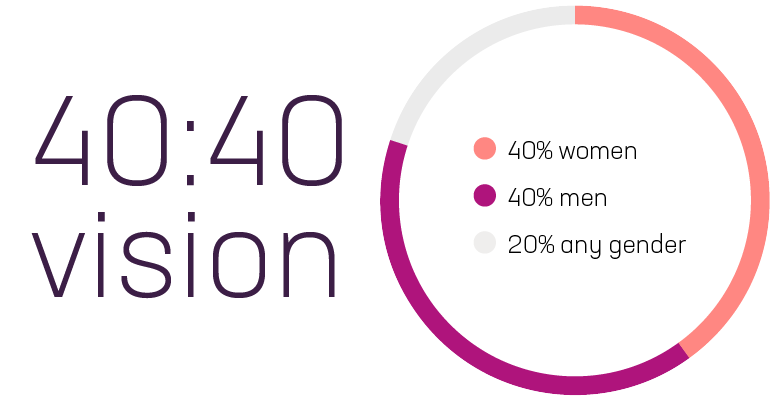Modern slavery
Iress’ zero tolerance for modern slavery is communicated to all suppliers, contractors, and business partners at the outset of those business relationships, and reinforced thereafter. Iress has a Supplier Code of Conduct which requires suppliers to ensure they comply with the terms of the Acts. Iress is required to report on compliance with the Modern Slavery Act 2015 (UK)—the UK Modern Slavery Act, and the Modern Slavery Act 2018 (Cth)—the Australian Modern Slavery Act. 2020 Modern Slavery statement.
Diversity & inclusion
Our people are our greatest asset, and at Iress, we recognise and respect that each person is unique. We acknowledge that diversity makes Iress stronger—our global commitment is simple: we want to create and maintain a workplace where our people can achieve their best regardless of individual differences, gender, physical attributes, family status, sexual orientation, age, race, origin, ethnicity, religious beliefs, or ideology.
In 2024 our priorities include:
- Participating in the 40:40 Vision for representation of 40% Women, 40% Men, 20% any gender at Board, Leadership Team and Senior Leadership levels by 2030.
- Attracting diverse talent, with objectives to target 45% of female representation of candidates to be interviewed for all roles, and 50% female representation of hires in New Talent Programs. We will also deliver focused DEI Training on inclusive recruitment to our Talent Acquisition team, and maintain our endorsed Employer Status with Work180 in both the UK and Australia.
- Ensuring there is no bias in how we remunerate by continuing to undertake an annual Gender Pay Gap analysis and submitting Gender Pay Gap reports.
- Establishing a DEI council with a clear purpose to identify any barriers to diversity and inclusion in our current practices, recommend new programs or practices, and track the long-term progress of promoting a culture of inclusion.
- Delivering DEI Foundation training to all people to raise the level of understanding and awareness of DEI, what inclusion really means and how it can benefit Iress, teams, leaders and individuals.
- Publishing a DEI statement of intent stating what Iress intends on achieving in broadening our focus beyond gender diversity.
Iress Connected
Iress Connected is a group that brings together employees across disciplines, teams, and demographics to discuss and explore concepts that broaden our understanding of what it means to be part of a truly diverse and inclusive community.
In 2023 we:
- Celebrated #EmbraceEquity on International Women’s (IWD) day by giving everyone at Iress an opportunity to nominate a woman they work with and provide a description about why they admired them,. We also supported local charities focused on helping women.
- facilitating interactive global webinars with Leaders for Good to gain a deeper understanding of the concept of equity and gender inequality, and learn clear actions we can take as individuals to drive equity.
- Celebrated Global Accessibility Awareness Day.
- We initiated the Reflect stage of the Reconciliation Action Plan through the creation of a working group represented by people across states and business units.
Wear it Purple Day
At Iress, we strongly believe in creating a diverse and inclusive environment where people feel supported to be their authentic selves at work. This is one of the reasons why we celebrate the annual Wear it Purple Day in support of rainbow (LGBTQIA+) youth in Australia.
In recent years, we have gathered together in our offices to show our support—wearing the Iress purple proudly. While this year saw us separated by COVID-19 restrictions, we gathered virtually to show our support on the day with a live band and celebration.
"When I was going through my own journey as a young LGBTQIA+ person, it was a time in my life when I felt the most alone as I desperately tried to make sense of my feelings and hide a secret I didn't want anyone to know. Wear it Purple Day reminds me and hopefully other young LGBTQIA+ people, that we are not alone".
Sam Johnson - General Manager, Strategic Support .
Diversity measurable objectives
Iress adopts an objective of achieving the following representation at board, leadership team, and senior leadership levels by 2030.

Superannuation/pension during parental leave
From 2022, we are providing payment of retirement contributions on full salary for the duration of parental leave, for a maximum of 12 months.
Indigenous Inclusion Plan
The United Nations Declaration on the Rights of Indigenous Peoples acknowledges Indigenous people are “the world’s most vulnerable, disadvantaged and marginalised peoples”. Iress’ ambition is to scope an Australian Indigenous inclusion program in 2022 to assess areas of greatest impact and alignment. This includes implementing an ‘Acknowledgement of Country’, which recognises the traditional owners of the land in which we work.
Traditional Owners
| Australia | Traditional Owners |
| Adelaide | Kaurna peoples of the Adelaide Plains |
| Albury | Wiradjuri peoples |
| Brisbane | Turrbal peoples from the northside of the river and Jagera peoples of the south side of the river |
| Hobart | Muwinina peoples |
| Melbourne | Bunurong Boon Wurrung and Wurundjeri Woi Wurrung peoples of the Eastern Kulin Nation |
| Perth | Whadjuk Noongar peoples |
| Sydney | Gadigal peoples of the Eora Nation |
| Wollongong | Dharawal peoples |
| Canada | |
| Toronto | Mississaugas of the Credit, the Anishnabeg, the Chippewa, the Haudenosaunee and the Wendat peoples. Toronto is now home to many diverse First Nations, Inuit and Métis peoples. |
| New Zealand | |
| Auckland | Māori peoples of; Ngāti Pāoa, Ngāi Tai, Te Wai-o-Hua (who originate from Ngā Oho), Ngāti Whātua-o-Ōrākei, Ngāti Te Ata and Te Kawerau-a-Maki. |
| South Africa | |
| Cape Town, Durban & Johannesburg | Sān and Khoekhoe also grouped together as Khoesān. |



